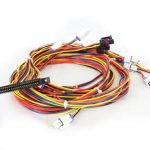Myth 1: Price is the most important factor when selecting an ECM Partner
One of the most common myths about selecting an ECM partner is that price should be the primary consideration. While cost is certainly an important factor, it should not be the only one.
Fact: Quality, reliability, and expertise are equally important
When selecting an ECM partner, it’s crucial to consider factors such as:
- Quality of workmanship
- Reliability of delivery
- Expertise in your specific industry or product type
- Ability to scale production as needed
- Communication and customer service
Focusing solely on price can lead to subpar products, delayed deliveries, and ultimately, higher costs in the long run.
Myth 2: All ECM partners are the same
Another common myth is that all ECM partners are essentially the same, offering similar services and capabilities.
Fact: ECM partners vary greatly in terms of capabilities, expertise, and service offerings
ECM partners can differ significantly in terms of:
- Manufacturing capabilities (e.g., PCB assembly, box build, cable assembly)
- Industry expertise (e.g., medical, aerospace, automotive)
- Certifications and quality standards (e.g., ISO 9001, AS9100, ISO 13485)
- Geographic location and logistics
- Value-added services (e.g., design support, testing, supply chain management)
It’s essential to evaluate each potential ECM partner based on their unique strengths and how well they align with your specific needs.
Myth 3: Bigger ECM partners are always better
Some companies believe that larger ECM partners are inherently better, assuming they have more resources and capabilities.
Fact: Smaller ECM partners can offer specialized expertise and personalized service
While larger ECM partners may have more extensive resources, smaller partners can offer advantages such as:
- Specialized expertise in niche industries or product types
- More personalized service and communication
- Greater flexibility and adaptability to changing needs
- Lower minimum order quantities (MOQs)
The right-sized ECM partner for your company depends on your specific requirements and priorities.

Myth 4: Offshoring is always cheaper than domestic manufacturing
Many companies assume that offshoring electronics manufacturing to countries with lower labor costs, such as China or Mexico, is always the most cost-effective option.
Fact: Total cost of ownership (TCO) should be considered, including hidden costs and risks
When evaluating offshore vs. domestic manufacturing, it’s important to consider the total cost of ownership (TCO), which includes factors such as:
- Shipping and logistics costs
- Inventory carrying costs
- Quality control and rework expenses
- Intellectual property (IP) risks
- Communication and travel costs
- Tariffs and import duties
In some cases, the TCO of domestic manufacturing may be lower than offshoring, particularly for products with lower volume, higher complexity, or shorter lead times.
Myth 5: ECM partners are only for large companies
Some companies believe that ECM partners are only suitable for large corporations with high-volume production needs.
Fact: ECM partners can serve companies of all sizes and production volumes
ECM partners can work with companies of all sizes, from startups to Fortune 500 corporations. Many ECM partners offer flexible manufacturing options, such as:
- Prototyping and low-volume production
- High-mix, low-volume (HMLV) manufacturing
- High-volume production
- Kanban and just-in-time (JIT) inventory management
The key is to find an ECM partner that can scale with your business and adapt to your changing needs over time.
Myth 6: In-house manufacturing provides more control and flexibility
Some companies believe that keeping electronics manufacturing in-house provides more control over the process and greater flexibility to make changes.
Fact: ECM partners can offer greater control, flexibility, and expertise
Outsourcing to an ECM partner can actually provide more control and flexibility than in-house manufacturing, as well as access to specialized expertise and resources. Benefits of outsourcing include:
- Access to state-of-the-art equipment and technology
- Ability to quickly scale production up or down as needed
- Flexibility to focus on core competencies while leveraging external expertise
- Improved supply chain management and risk mitigation
- Reduced capital expenditures and fixed costs
Myth 7: ECM partners are only for manufacturing, not design
Another common myth is that ECM partners are only involved in the manufacturing process, not in product design or development.
Fact: Many ECM partners offer design support and value-added services
Many ECM partners offer a range of value-added services beyond manufacturing, such as:
- Product design and engineering support
- Prototyping and testing
- Component selection and sourcing
- Design for manufacturability (DFM) analysis
- Regulatory compliance and certification support
By involving an ECM partner early in the design process, companies can optimize their products for manufacturing and avoid costly design issues down the line.
Myth 8: Long-term contracts are always necessary with ECM partners
Some companies believe that working with an ECM partner requires a long-term contract or commitment.
Fact: Many ECM partners offer flexible contract terms and manufacturing options
While some ECM partners may require long-term contracts, many offer flexible terms and manufacturing options to accommodate different business needs, such as:
- Project-based or short-term contracts
- Consignment inventory or vendor-managed inventory (VMI)
- Kanban or just-in-time (JIT) manufacturing
- Flexible minimum order quantities (MOQs)
It’s important to discuss your specific needs and preferences with potential ECM partners to find the best fit for your business.
Myth 9: Switching ECM partners is too disruptive and costly
Some companies are hesitant to switch ECM partners, believing that the process is too disruptive and costly.
Fact: A well-planned transition can minimize disruption and improve long-term outcomes
While switching ECM partners does require some upfront effort and planning, a well-executed transition can minimize disruption and lead to improved long-term outcomes, such as:
- Better quality and reliability
- Improved communication and service
- More flexible and scalable manufacturing options
- Reduced costs and improved profitability
To ensure a smooth transition, it’s important to:
- Clearly define your requirements and expectations
- Develop a detailed transition plan with your new ECM partner
- Allow sufficient time for knowledge transfer and process validation
- Maintain open communication with all stakeholders throughout the process
Myth 10: Once you choose an ECM partner, you’re locked in for the long haul
Finally, some companies believe that once they choose an ECM partner, they are locked into that relationship for the long term.
Fact: Regularly evaluating and adjusting your ECM strategy is important for long-term success
While building a strong, long-term relationship with your ECM partner is important, it’s also crucial to regularly evaluate and adjust your strategy as your business needs evolve. This may involve:
- Periodically assessing your ECM partner’s performance and alignment with your goals
- Exploring new manufacturing options or technologies as they become available
- Diversifying your supply chain to mitigate risk and ensure continuity
- Continuously improving communication and collaboration with your ECM partner
By viewing your ECM partnership as an ongoing, dynamic relationship, you can ensure that it continues to meet your needs and drive long-term success.
Frequently Asked Questions (FAQ)
1. How do I know if an ECM partner is the right fit for my company?
To determine if an ECM partner is the right fit for your company, consider factors such as:
- Alignment with your specific industry, product type, and quality requirements
- Ability to meet your current and future manufacturing needs (e.g., volume, mix, lead times)
- Demonstrated expertise and experience in your domain
- Compatibility with your company culture and communication style
- Willingness to collaborate and adapt to your evolving needs
2. What should I look for in an ECM partner’s quality management system?
When evaluating an ECM partner’s quality management system, look for:
- Relevant certifications and standards (e.g., ISO 9001, AS9100, ISO 13485)
- Documented quality processes and procedures
- Robust testing and inspection capabilities
- Continuous improvement initiatives and metrics
- Transparency and communication around quality issues and corrective actions
3. How can I ensure a smooth transition to a new ECM partner?
To ensure a smooth transition to a new ECM partner:
- Clearly define your requirements and expectations upfront
- Develop a detailed transition plan with milestones and responsibilities
- Allow adequate time for knowledge transfer and process validation
- Maintain open communication with all stakeholders, including your old and new ECM partners
- Monitor progress closely and address any issues promptly
4. What are some red flags to watch out for when selecting an ECM partner?
Some red flags to watch out for when selecting an ECM partner include:
- Lack of transparency or communication
- Inconsistent or poor quality
- Frequent delays or missed deliveries
- Unwillingness to provide references or quality documentation
- High employee turnover or instability
- Misalignment with your company’s values or culture
5. How often should I review and assess my ECM partnership?
It’s a good practice to review and assess your ECM partnership on a regular basis, such as:
- Quarterly or semi-annual performance reviews
- Annual strategic planning sessions
- Ad-hoc assessments triggered by significant changes (e.g., new product introduction, market shifts)
During these reviews, evaluate your ECM partner’s performance against agreed-upon metrics, discuss any issues or concerns, and explore opportunities for improvement and growth.
Conclusion
Selecting the right Electronic Contract Manufacturing (ECM) partner is a critical decision that can have a significant impact on your company’s success. By understanding the facts behind common myths and misconceptions, you can make a more informed and strategic choice.
Remember to consider factors beyond just price, such as quality, expertise, and alignment with your specific needs. Don’t be afraid to explore options with partners of different sizes and locations, and be open to involving your ECM partner in the design process for optimal results.
Finally, view your ECM partnership as an ongoing, dynamic relationship that requires regular evaluation and adjustment to ensure long-term success. By fostering open communication, collaboration, and continuous improvement, you can build a strong and mutually beneficial partnership that drives growth and innovation for your business.






Leave a Reply